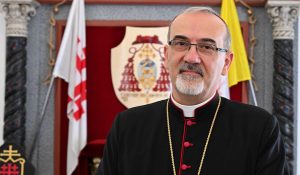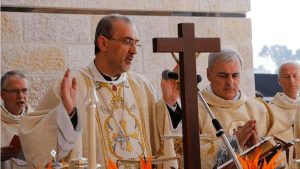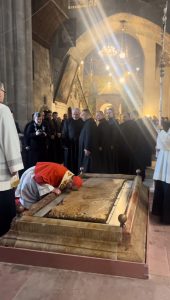His Beatitude Card.Pierbattista Pizzaballa Latin Patriarch of Jerusalem shared with us his life experience in the Holy Land.
Part I – I would like to start by asking you, how you discovered your vocation ?

Pierbattista Pizzaballa Latin Patriarch, Jerusalem
I’m the third child of a normal family, born in a small village north of Italy, agricultural at that time, where the religious life was still simple and authentic. So, when I was a child, I had good examples from my father, mother, and so on. We had in our parish four priests. The priests were very good, good persons, people loved them, they loved the people, and they were very present in the life of the community. One of the priests was very special; he was very charismatic, very positive, so I always said to myself, “I want to be like him.” He was also very tough, but you would understand that he was sincere, and he acted out of love. I saw how people loved him, how he loved people, and also, he was, I don’t want to say happy, that is too little, he was a fulfilled person, more than happy. He was confident, good, a person that was completely fulfilled. So, his faith was attractive, a real good priest. When he came to the community, he came to visit, to comfort, to pray, to hear confessions, and to be present. So that was the beginning, nothing special, I didn’t have any revelation, just good examples.
Then, I was sent to a school for children, elementary school, very far from my village, in Rimini. At that time, the parish priest in our villages was like a king. And he said, let him go to this school with the religious Benedictine sisters of semi-apostolic life.
There, there was Mass every day and the chaplains were Franciscans. They were very old, Franciscan friars, but then, all of a sudden, a new young one came, Father Giovanni Bianchi, who had just arrived from the Holy Land, by the way. He was in charge of the minor seminary, so he started the art of fishing. I didn’t know Franciscans, because in Bergamo there were no Franciscans. He started talking about the vocation of Franciscans and brought us to see the seminary. So I decided to enter. After I finished elementary school at 11 years old, I decided to enter the minor seminary.
My parents didn’t agree, because Rimini is far away from our house, Bergamo is 400 kilometers to the north. But I insisted—I was always, still now, very stubborn, when I say yes, it’s yes, when I say no, it’s no. So, at the end they surrendered. And then I entered the minor seminary.
It was a very disciplined seminary at the time, 1976. There was a community of formation together with others, old friars. Many of them were former missionaries in China. They were expelled by Mao in 1949. And I remember that every day they kept reading the Bible in Chinese, to be ready the day they could go back. I was very impressed by this. So, we created a missionary group, and we asked them to teach us Chinese, because “if you are too old, we will go in your place.” But my superiors stopped me: “No Chinese.” That’s all.
Of course, in the seminary we had normal ups and downs, like everyone… The seminary was a huge building, and part of it was dedicated to a public school, so we went there to study.

HB. Pierebattista Pizzaballa at Saxum
And what about your personal encounter with God?
Personal encounter with God, for us, coming from the minor seminary, usually is not a special moment. You don’t have a special moment, at least I did not have one. It’s something that grows. The seed of the presence of God, of the faith, is coming from your childhood, family and so on. Then it develops, sometimes very painfully, sometimes with a lot of problems: yes, no, maybe, perhaps, maybe I was not right, or let’s say, influenced by others… those were all normal questions that I had. But little by little you discover that this small seed of vocation grows in you. And at a certain point you discover that it’s part of you.
And then how did you come to the Holy Land?
Oh, my coming to the Holy Land, even here, was nothing dramatic. I never wanted to come to the Holy Land. My Provincial, at the time, was still old-fashioned about obedience—now there is more dialogue. I remember one of the meetings with him when he asked me, “What do you plan for your future? What is your desire?” I told him “I would like to study the Bible. I like the Bible and especially the Old Testament”—I don’t know why but I like it. He told me, “You will go to study,” and I thought I would go to Rome.
After the priestly ordination—I was ordained by Cardinal Biffi, the Bishop of Bolognia—I received what is called the obedience, and the obedience was: “We have decided that you will go to Jerusalem immediately.” I was shocked. I thought this was a mistake. I organized a lobby of friars to convince him otherwise. But nothing changed, so I arrived in Jerusalem to study at the Studium Biblicum Franciscanum. By the way, there was a lack of communication and when I arrived the Custos didn’t know that I was coming, so in the convent of the Flagellation they were not prepared and had to give me a provisional room.
I had been ordained a priest on the 15th of September 1990, when I was 25 years old, and three weeks later, on 7th of October 1990, I arrived in Jerusalem. This year is the 35th anniversary of my ordination, and of my coming here, as well.

Card. Pierbattista Pizzaballa at the Holy Sepulcher, Holy Week 2025
How did you get involved in the Hebrew-speaking parish?
In all the important passages of my life, I have felt a little bit like Jonah. The book I like the most in the Old Testament is Jonah. I like all the books, but Jonah in a more stable way. I feel a little bit like him. I resist, then I go into the deep water and God puts me here or there.
I was studying at the Hebrew University. At that time, the Hebrew Catholic community was without a priest. It was in Agron Street, in Mamilla. Once a priest who afterwards became a Bishop, Bruno Forte, and who was very much in love with the Hebrew Catholics, went there to the Mass and saw that there was no priest. He was a guest at the Flagellation. He told me: “you are a priest, you speak Hebrew.” I said “Right, but it’s not for me.” So, he went to meet a very charismatic woman named Rina Geftman—she passed away a few years ago—, and he fixed an appointment for me with her. She said, “please come to celebrate the Mass because we don’t have a priest.” I said “I will come just once.” I went to celebrate the Mass and I said “I’ll come when you don’t find someone.” So, it became almost every Sunday. In the end, I remained there, responsible for the Hebrew Catholic community.
We had the Mass at the Lazarist brothers’ convent in Agron St., close to the Rosary sisters, but soon we had to move because they needed to rent the place. Initially, the Custos gave us a room in Terra Santa College for a short period of time. We were looking for a place, and the Custos allowed us to move to an abandoned house in Rav Kook St. that belongs to the Custody. We restored it in the difficult times of the second Intifada. From January 2000 to 2004, I was in charge of a Hebrew speaking Franciscan community on the first floor, and we took care of the Hebrew-speaking Catholic community on the ground floor.
By Blanca Ramirez, Visitor Center Manager
To be continued, don`t miss it next month….
